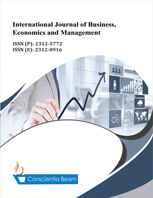An Empirical Investigation into the Key Drivers of Economic Performance in the CEMAC Zone: A Panel Corrected Standard Errors Approach
DOI:
https://doi.org/10.18488/journal.62.2018.56.189.200Abstract
The economic performance of CEMAC countries is severely poor, when compared to other communities of the same region. It is on the bases of this background, that this paper purports to empirically investigate the potential key drivers of economic performance in the CEMAC zone. Specifically, the study attempts to scrutinise the effect of: (a) educational expenditure, (b) gross physical capital formation, (c) public health expenditures, and (d) private health expenditure on economic performance. To ascertain these objectives, data is sourced from the World Bank Development Indicators (WDI) of 2017 and used is made of both descriptive and inferential statistics. The Panel-corrected standard errors (PCSE) regression model was employed to test the objectives, due to its capacity to produce appropriate standard error estimates with very insignificant loss of efficiency. The empirical findings, among others suggested that, all forms of investments included in the model, significantly influenced the economic performance of countries in the CEMAC sub-region. Specifically, the results showed that educational expenditure and gross physical capital formation positively influence economic performance in the CEMAC zone. Intriguingly, public and private health expenditures negatively influence economic performance in the said zone. The policy implications of these findings suggest that, emphasis should be laid on increasing investment on government’s educational expenditure and gross physical capital formation in the CEMAC zone, if economic performance must be revived.

